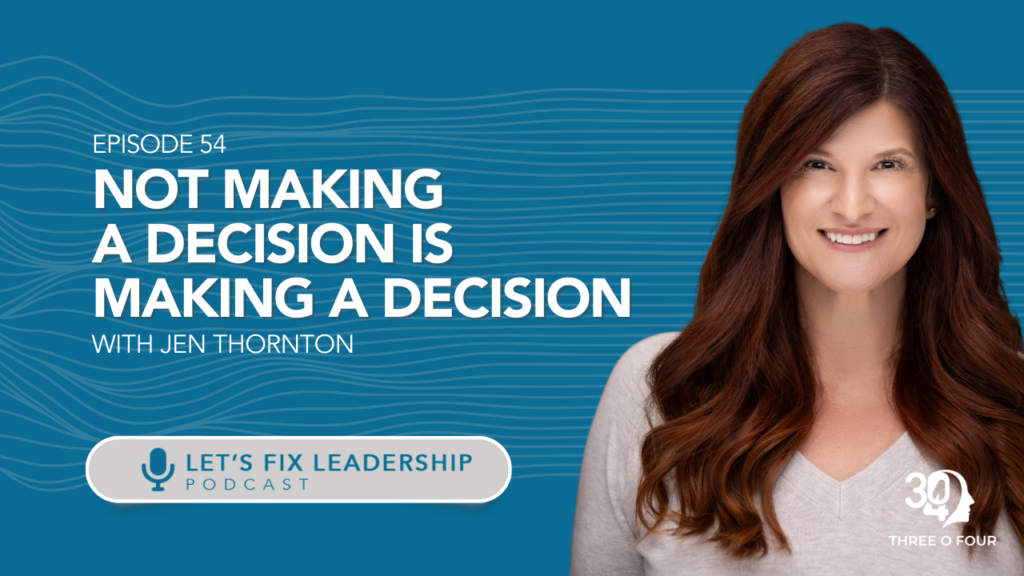0:00:04.4 Jen Thornton: The landscape of business is changing radically. Yet, leadership is being taught the same old way it's always been taught. When the world is changing, it's time to bring our leadership styles along for the ride. Thanks to cutting-edge neuroscience, we now have access to new tools and new language that inspires action, collaboration, and innovation in the modern workplace. I started this podcast to bring you the best of these cutting-edge tools, exercises, best practices, and modern leadership strategies, every single week. Whether you're a company leader, a corporate visionary, or an entrepreneur, this show gives you new insights into neuroscience in language of leadership, as well as practical steps and tips you can take back to the office. So you, can lead your team in a powerful way, keeping your people happy and engaged while achieving your biggest goals, because no one has ever changed the world by doing things the way they've always been done. I'm your host, Jen Thornton. I'm a talent strategist, an executive coach, speaker, and the founder of 304 Coaching. Now let's fix leadership.
0:01:09.2 JT: Oh, the decisions we must make or not make. Ever feel like your day is just one decision after another? Well, then you are normal. In the high stakes realm of professional leadership, the ability to make a swift impactful decision is often held as a hallmark of effective leadership. Yet, amidst the whirlwind of meetings, emails, projects, market shifts, strategic pivots, all the stuff, there lies a subtle overlooked aspect of decision making. And that's this silent, yet profound impact of not making a decision. Yep, not making a decision is making a decision. And more times than I'd like to recognize, leaders struggle not because of decisions they've made, but because of the lack of making decisions. So why does this even happen? At the heart of executive leadership lies the relentless demand for decision-making. Every choice from a strategic direction to operational adjustment shapes the trajectory of an organization. However, it is critical for leaders to recognize the act of not making a decision is a decision in itself. This form of non-decision can stem from a various factors including overwhelm, fear of making the wrong choice, or even the strategic delay for more information. Yet, the impact of the silent choice of not making decisions are real and often carry the same weight as active decisions, and there are ripple effects of not making a decision.
[music]
0:02:53.3 JT: Let's take a quick break from the conversation. Do you have new leaders on your team, and you can see their potential, you can see their runway, but you cannot figure out how to get them across the finish line? Reach out to 304 Coaching and learn more about our brain-based, competency focused executive coaching.
0:03:15.5 JT: And decision, particularly at the executive level, since it ripples throughout an organization, it can manifest in lost opportunities, diminished morale, and the culture of uncertainty. Teams look up to leaders for direction, and when decisions are not made, it can lead to a void, causing projects to stall and innovation to weigh in. The message sent is one of uncertainty, which can erode trust and confidence, both internally among your employees and also externally among stakeholders and customers. But maybe not making a decision could also be a strategic move. Understanding the impact of making a decision allows leaders to harness it strategically, rather than fall victim to its potential pitfalls. In certain situations, choosing to delay a decision can be a powerful tool. It can provide the necessary time to collect additional information, reflect, maybe consult with an advisor or stakeholder. However, the key lies into actively making the choice to wait, rather being paralyzed by indecision.
0:04:27.1 JT: This approach transforms indecision from a passive state to an active state, where the leader is in control, setting the timeline and the criteria for when and how a decision will be revisited. So what is the art of silent decisions? It's one of those competencies that has multiple skills in it. It's a combination of many things that builds on the confidence to be a decisive decision maker or a decisive and purposeful non-decision maker at any given time. First, let's recognize the power of non-decision. Understanding that not deciding is a choice that influences outcome and perceptions. Know yourself, know what type of decisions you avoid and why. Work with your coach or do self-reflections on why you shy away from certain decisions in certain situations. Working through your own personal triggers help you make more confident decisions. Remember to only use non-decision making when strategically purposeful, not because you're paralyzed or ignoring it.
0:05:37.6 JT: The other thing you can do is learn strategic patience. Know when to pause to gather more information, and know when your delay is merely avoidance. And always provide clear communication, articulating the rationale behind the decision to delay, and setting clear expectations for the next steps. When your team knows why a decision hasn't been made, they are not as distracted by the unknown, and of course, foster a decisive culture, encouraging a culture where team members are empowered to make decisions, therefore reducing bottlenecks and promoting a dynamic responsive organization.
0:06:18.5 JT: So non-decision decisions are not always a bad thing. When you are unconsciously making a choice to not make a decision, you're ignoring issues or shying away from the decision out of the fear, and you're actively not making a decision, this has so many negative impacts on you, your team, and your performance. But from time to time, you may have to delay decision-making, and that's okay if it's done with focus and purpose. So use those time sparingly. Use non-decision with thoughtfulness and when not making a decision has a positive impact on the organization or any given situation. So let's fix leadership by being those decisive decision makers. Do you have an idea or a topic we should discuss here together on Lets Fix Leadership? Send your ideas and your questions directly to me at hello@letsfixleadership.com.
[music]
0:07:24.6 JT: Thanks for listening to Lets Fix Leadership. By hanging out with me today, you're already on your path. If you're looking to learn more and to see if your company is a good fit for our coaching and leadership education, then hey, visit 304coaching.com. If you got value out of this podcast, share it with a friend, and it would mean the world to me if you would leave a thoughtful review and a rating on iTunes. Thanks again for listening, and I appreciate your work in fixing leadership.
[music]




